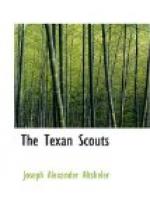“I think I hear the feet of horses movin’ now an’ then,” he said, “an’ if so, one of us had better stay behin’ with ours. A horse of theirs might neigh an’ a horse of ours might answer. Yon can’t tell. Obed, I guess it’ll be for you to stay. You’ve got a most soothin’ disposition with animals.”
“All right,” said Obed philosophically, “I’d rather go on, but, if it’s better for me to stay, I’ll stay. They also serve who stand and hold the reins. If you find you’ve got to leave in a hurry I’ll be here waiting.”
He gathered up the reins of the three horses and remained quietly on the plain, while Ned and the Panther went forward, making straight for the light.
When they came to the edge of the chaparral they knelt among the bushes and listened. Now both distinctly heard the occasional movement of horses, and they saw the dusky outlines of several figures before the fire, which was about three hundred yards away.
“They are bound to be Mexicans,” whispered the Panther, “’cause there are no Texans in this part of the country, an’ you an’ me, Ned, must find out just who they are.”
“You lead the way, Panther,” said Ned. “I’ll follow wherever you go.”
“Then be mighty careful. Look out for the thorns an’ don’t knock your rifle against any bush.”
The Panther lay almost flat. His huge figure seemed to blend with the earth, and he crept forward among the thorny bushes with amazing skill. He was like some large animal, trained for countless generations to slip through thickets. Ned, just behind him, could hear only the faintest noise, and the bushes moved so little that one, not knowing, might have credited it to the wind.
The boy had the advantage of following in the path made by the man’s larger figure, and he, too, was successful in making no sound. But he could hear the stamp of horses’ feet clearly now, and both to left and right he caught glimpses of them tethered in the thickets. His comrade stopped at last. They were not more than a hundred yards from the fire now, and the space in front of them was mostly open. The Panther, crouching among the bushes, raised his finger slowly and pointed toward the fire.
Ned, who had moved to one side, followed the pointing finger and saw Urrea. He was the dominant figure in a group of six or seven gathered about the flames. He was no longer in any disguise, but wore an officer’s gorgeous uniform of white and silver. A splendid cocked hat was on his head, and a small gold hilted rapier swung by his side.
It may have been partly the effect of the night and the red flame, but the face of Urrea had upon Ned an effect much like that of Santa Anna. It was dark and handsome, but full of evil. And evil Ned knew Urrea to be. No man with righteous blood in his veins would play the spy and traitor as he had done.
“I could shoot him from here,” whispered the Panther, who evidently was influenced in a similar way, “then reach our horses an’ get away. It might be a good deed, an’ it might save our lives, Ned, but I’m not able to force myself to do it.”




